World Cup 2018: The faces female fans want you to see
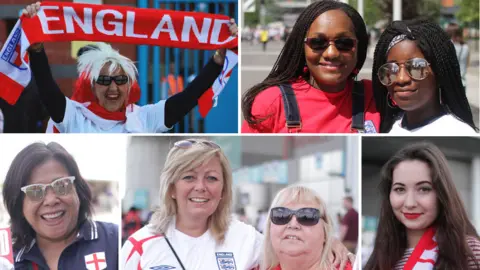 This Fan Girl
This Fan Girl Put "female football fan" into a search engine and the image results are a stream of attractive young women in tight shirts and, sometimes, no shirts.
Tired of sexualisation and misrepresentation, some fans have decided it's time to level the playing field.
"These images represent everything that's great about this game - how many different kinds of women go to matches and support. We need this realness," says Emma Townley, from online community This Fan Girl.
She's talking about five images of female England fans taken ahead of this World Cup, which she hopes will start replacing photos of scantily-clad female fans in search engine results.
The pictures show the different ages, races and shapes of the women supporting football and the idea is the more they are shared online and used by media outlets, the higher up the search results they will go.
Their aim, to "change the face of female football fans on the internet".
Alongside their day jobs, the team behind This Fan Girl have spent the last two years documenting women who support football by photographing fans at matches across the country.
The #WeAreFemaleFans campaign is all about inclusivity and desexualising women in football, Emma says.
Allow X content?

And it is a problem for football, particularly. An online image search of "female rugby fan", for example, does not feature any sexualised images of women in the top results.
Fleur Cousens, 25, the founder of Goal Diggers - a football club for women and non-binary people in north London - says this has a damaging impact on all levels of the game.
"Women are sexualised from grass roots teams to fans. It's so sad. Even just now at training there was a guy that walked past and whistled at us and made comments," she says.
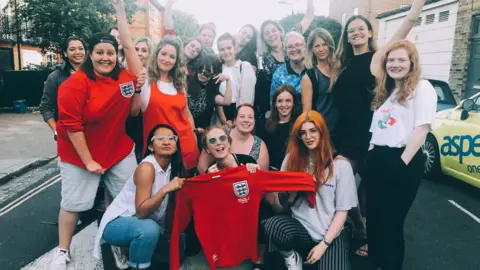 This Fan Girl
This Fan Girl Fleur argues sexualised images undermine women who are already having to prove themselves in an arena still considered "a man's space".
"If you play on a mixed team, you basically have to get on the pitch, do a scissor kick and score a goal with your eyes shut before you're taken seriously and that's basically what's happening with the World Cup.
"As a fan, you're often tested by men, you get put on the spot and they want to catch you out because they don't believe it, they smell a rat."
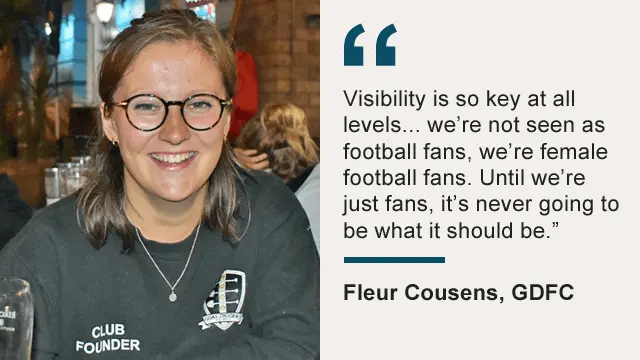
If anyone was in doubt of the attitudes and images fans are up against, this week Getty - one of the world's largest picture agencies - published a photo gallery of "the hottest fans at the World Cup".
Getty later removed it, adding that it did not meet its editorial standards.
But for Emma and many others, this was an all too familiar slip-up which shows how much more progress is needed.
"My initial thoughts were 'do I laugh or cry?'," Emma says. "I was fuming. It was blatant misogyny. We've got to stop perpetuating the idea this is ok."
It's not just about appearances, Emma adds, but re-establishing the balance for the next generation of fans and players.
"Teenagers watching this World Cup are seeing the likes of (commentators and pundits) Alex Scott, Vicki Sparks and Eni Aluko.
"There have been some real high points - but some absolute clangers too. We can't sit back just yet."
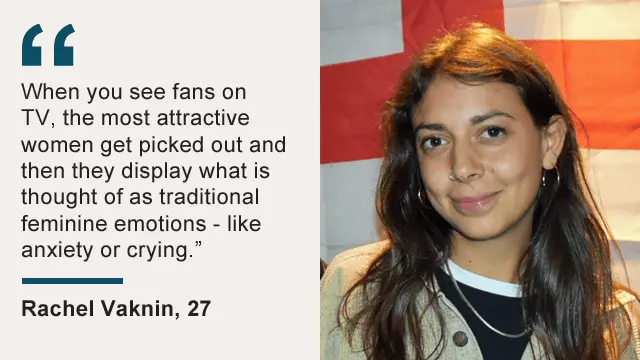
About those "clangers"...
- French footballer Patrice Evra was criticised for patronising behaviour for clapping fellow pundit Eni Aluko's analysis of the Costa Rican team as part of ITV's World Cup coverage. He said he was "really impressed" by Aluko - who has 102 caps for England and has recently signed for Juventus - and turned to pundit Henrik Larsson to say "she knows more about football than us"
- On the BBC, Phil Neville - the England Women's coach - was accused of mansplaining to pundit Alex Scott, repeating a point she had made seconds before
- Meanwhile Vicki Sparks - who became the first woman to commentate live on a televised World Cup match in the UK - was criticised for her "high-pitched tone" by Jason Cundy. The ex-Chelsea player apologised for his remarks, adding there was "no place for these demeaning attitudes"
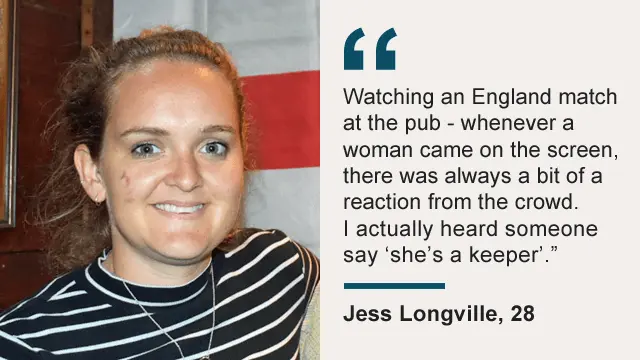
For Fleur, the divide between male football fans and female football fans remains.
"Until we're just fans, it's never going to be what it should be and we're always going to have to spend that extra bit of energy to prove that we're a footballer, to do that scissor kick, to answer all the questions about every formation that's ever been at Man United if you're a Man U fan and to sit there like Scott and Aluko and prove that you have the knowledge."
This was a sentiment echoed by Chelsea fan, Anna Cooke, who works for energy drinks company Carabao - the football sponsor which has backed This Fan Girl's campaign.
"We want these women to be seen as proper football fans instead of being objectified," she says.
And recognition is what is at the core of this debate.
"You'll have a woman who's been a season ticket holder for 30 years," Emma says. "To have her photograph taken at a match and published, for her to be recognised as a fan, is so empowering for her."
Emma is optimistic about the future - more so than the success of the England team - which she predicts will get no further than the final 16.
